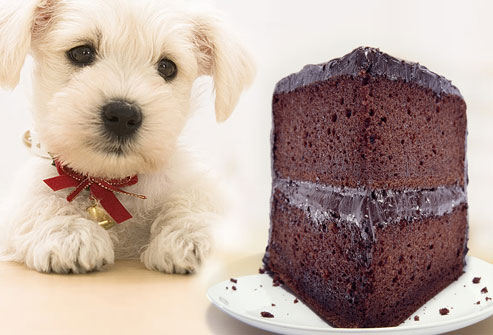It’s Valentine’s Day — another holiday that dogs don’t understand.

Is Chocolate Toxicosis Real?
Of course, they don’t need to possess a fully-developed concept of a holiday in order to feel comfort or excitement when we shower them with love, affection, and gifts. But if there is someone important in your life whose concept of Valentine’s Day is a bit more “sophisticated” than your dog’s we politely suggest that you focus your attention on that person today.
To help you out, we’ll be limiting today’s discussion to a single topic and keeping our treatment of it short and to-the-point:
Will there be chocolate floating around your home this Valentine’s Day? Have you heard the rumor that chocolate is poisonous for dogs? Want to know if the rumor is true? We’re glad to help…
If you’re a regular Optimal Dog reader, you probably already know our stance on feeding sugary treats to dogs: if you’re gonna do it at all, save it for rare occasions, only give treats in very small doses, and never serve up sugary treats in combination with salts and fats.
But chocolate is a unique case. Based on our review of publicly-available studies and other sources (remember that the authors of the Optimal Dog are not veterinarians and you should always consult your veterinarian before making changes to your dog’s life that will impact her health), we have concluded that the veterinary community is essentially in agreement that you should never feed chocolate to your dog.
In short, the rumor that chocolate is poisonous for your dog is not an urban legend. It’s grounded in truth.
A review of the studies and articles linked above will tell you all you need to know to about the risk which chocolate poses to your dog. In addition, here’s a quick explanation of the relevant science and a few tips for how to integrate this knowledge into your relationship with your dog:
Chocolate contains a chemical compound called theobromine, a substance which stimulates both the cardiovascular and central nervous systems. Although chocolate also contains caffeine, theobromine is the primary reason that chocolate gives you a “buzz.”
Humans metabolize theobromine quickly — the amount present in a single serving of chocolate is usually fully processed in less than an hour. But it takes much longer for dogs and cats to process the stuff. According to Denver-area veterinarian Kevin Fitzgerald, PhD, half of the theobromine contained in chocolate will still be present in a dog’s system 17 hours after ingestion.
Even trace amounts of theobromine can cause vomiting and diarrhea in dogs. Truly toxic amounts can cause hyperactivity, tremors, high blood pressure, seizures, respiratory failure, and cardiac arrest.
What constitutes a “truly toxic amount” of theobromine? It depends on how large your dog is. Several veterinary sources suggest that a dog who ingests more than 100 mg/kg of body weight is seriously at risk of severe poisoning.
Obviously, the more theobromine a product contains, the more toxic it is. Unsweetened baking chocolate contains the most theobromine of any kind of chocolate — upwards of 400 mg/oz! That’s more than twice as much as semi-sweet chocolate and about ten times more than milk chocolate. White chocolate contains almost zero theobromine.
For detailed charts (and other tools) that explain how much theobromine is present in different kinds of chocolate and how much chocolate your dog can handle, go here, here, or here.
If you suspect that your dog has ingested a potentially-dangerous quantity of chocolate, you should immediately take the animal to an emergency veterinary clinic. Because there is no known antidote for theobromine toxicosis, your vet will induce vomiting in an attempt to purge the animal’s system of the toxic substance.
In short, enjoy a wonderful Valentine’s Day but keep those celebratory chocolates well out of reach of your pets.
Cheers,
Coach Dan

Leave a Reply